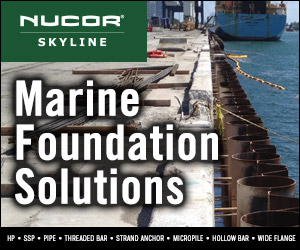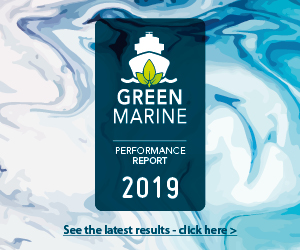The COVID-19 pandemic has created unprecedented challenges for seaports, which are seeing almost all lines of business affected. Container cargo volumes to and from East Asia are down; demand for refined petroleum is falling; cruise ships are tied up at piers around the world; and fishermen are facing a rapidly declining market. For this edition, editor in chief Tony Munoz brought together Commissioner Peter Steinbrueck, the president of the Port of Seattle Commission, and John Wolfe, the CEO of the Northwest Seaport Alliance, to talk about the impact of the COVID-19 outbreak on the Puget Sound region's port operations. As a thriving hub for the cruise, fishing and ocean freight industries, the Port of Seattle and the Northwest Seaport Alliance have a view into multiple aspects of the coronavirus pandemic's effects on shipping and ports. For more, listen in on their conversation here.
|
AAPA’s years of effort to get the full annual Harbor Maintenance Trust Fund (HMTF) tax revenues to be appropriated for their intended purpose of federal navigation channel maintenance has been finally realized. Last Friday, when the Coronavirus Aid, Relief, and Economic Security Act, or CARES Act, was signed into law, it included a full use provision for federal navigation channel maintenance. Senator Richard Shelby, R-Ala., Chairman of the Senate Committee on Appropriations, led the effort in Congress. The CARES Act language will go into effect on January 1, 2021, or the date of enactment of a Water Resources Development Act (WRDA) bill, whichever comes first. While this is a tremendous achievement for AAPA, additional work remains to address language in a WRDA bill that will include the remaining components of AAPA’s HMT solution for donor and energy transfer ports as well as funding assurances for emerging harbors and the Great Lakes region. AAPA expects WRDA to be enacted later this year.
|


April 5 is Ports Day! This year’s Ports Day will be a chance for the industry to commemorate its leadership resiliency and response to the COVID-19 global pandemic. The 2020 Ports Day theme, On the Front Lines, acknowledges the dedication, sacrifice and professionalism of the port industry workforce in their collective efforts to slow the spread of coronavirus while ensuring a steady flow of vital goods and services.
|
Due to the impacts of the coronavirus pandemic, AAPA is extending the association’s 2020 Communications Awards Program entry deadline to Monday, June 15. Even though the entry deadline has been extended, you should start preparing your 2020 AAPA Communications Award Program submissions today. For more information and to submit, go to https://bit.ly/3bfSdYJ. Winning entries from this year’s competition will be announced in August and individual awards (for Excellence, Distinction and Merit) will be shipped shortly after that. Winners who email back a photo showcasing their award(s) will be featured in an audio/visual presentation during AAPA’s 2020 Annual Convention and Expo in Québec City, Canada, which takes place Sept. 13-16. Entrants who win one of the three Overall Award of Excellence trophies will be presented their trophy at AAPA’s 2020 annual convention.
|
Stories from AAPA’s Western Hemisphere ports will be featured periodically in AAPA Advisory, like the following interview from The Maritime Executive, that will cover a variety of topics such as climate change, workforce development, infrastructure investments, etc. If you have an idea or story to share, contact Pam Maher ( pmaher@aapa-ports.org).
|
In a story covered by The Journal of Commerce on March 27, growing volumes of non-essential cargo, such as furniture, mattresses and toys, are competing for space with essential cargoes, such as COVID-19-related medical supplies and protective gear, at several major U.S. container ports, particularly along the East Coast. Space demand is growing as some retailers and manufacturers fail to pick up containers because warehouses are full or closed due to not being deemed “essential service providers” responding to COVID-19, or because retailers have requested delayed deliveries at distribution centers.
|
The Celebrity Eclipse was cleared to dock at the Port of San Diego’s B Street cruise ship terminal with approximately 2,500 passengers on board after careful consideration and collaboration with federal, state and local agencies. Extra precautions were put in place prior to the vessel’s arrival to minimize the spread and exposure to COVID-19. The Port of Seattle Commission today approved an immediate, short-term emergency financial relief package for airport-based businesses, barred evictions of tenants at Port of Seattle facilities (including live-aboard residents) due to an inability to pay rent through June 30, 2020, and authorized the executive director to provide additional immediate relief to port tenants such as maritime and real estate tenants.
|
The Port of Galveston reported cargo and lay-dockage activities for the first quarter of 2020 have continued to generate port revenues and jobs for port partners. To date, more than 750 wind tower pieces have moved through the port. The port also forecasts a record-breaking quarter for lay-dockage revenue, with 93 ship calls generating almost $1.3 million in port revenues. Container activity at Port Houston climbed 29% in February compared to the same period last year, while blank sailings in the month of March caused by a combination of the Lunar New Year and effects of the COVID-19 pandemic expect to impact volume in March and the months ahead at the nation’s sixth largest container port. The Port of Savannah achieved its busiest February ever last month, handling 364,405 TEUs, an increase of 17% over the same month last year.
|
The Port of Halifax has received its largest vessel call to date. The CMA CGM T. Jefferson, 366 metres length, 48 metres beam and 14,414 TEU capacity, arrived at PSA Halifax, which is the only Canadian port in Eastern Canada that can accommodate ultra-class vessels.
|
The Université Laval, the Institut Nordique de Recherche en Environnement et en Santé au Travail (INREST), and the Port of Sept-Îles have announced the launch of the new Research Chair in Coastal Ecosystems and Industrial, Port and Maritime Activities. The Chair’s mission will be to further the knowledge on coastal ecosystem functions in industrial port zones, in order to identify practices that will ensure a sustainable management of these environments.
|
| |
 |
| |
|
Alabama’s seaport modernization program continues to complete important milestones to meet shipper demand and accommodate larger vessels. The Alabama Port Authority completed its 400-foot container dock extension at the APM Terminals Mobile facility on March 20, and three days later, the terminal for the first time simultaneously handled two container ships at the newly expanded berth. In a joint statement, the Connecticut Port Authority and New England Central Railroad, Inc. announced a development agreement that facilitates the immediate opportunity to handle wind turbine components through the port, which at this time does not require rail service. The Port of Coos Bay continues work to rebuild the Charleston Ice Plant following a fire that resulted in the facility being declared a total loss. Port staff in tandem with contracted engineering and construction firms have been working aggressively to rebuild the plant as quickly as possible to mitigate impacts to the local commercial fishing fleet.
|

|
| |
|

